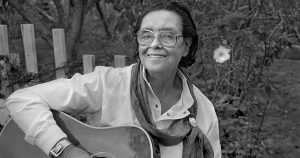Etta Baker was born Etta Lucille Reid in Caldwell County, North Carolina on March 31, 1913. Her father, Boone Reid, a musician who performed Piedmont blues on several instruments, taught her to play the six and twelve-string guitar and the five-string banjo.
Etta was one of eight children—four boys and four girls–with a heritage of African-American, Native American and European-American ancestors. She grew up learning hymns, rags, parlor music and Tin Pan Alley songs from her father. In addition to guitar and banjo, Etta also played piano and violin.

Etta dropped out of school in the tenth grade and during her early years often performed with her father and sister at dances and parties in and around Caldwell County.
In 1936, Etta married Lee Baker and they raised nine children. After her marriage, Etta stopped performing publicly but continued to play for family and friends in her two-finger style (thumb and index finger). She played in the tradition of Piedmont guitarists such as Elizabeth Cotton and Gary Davis.
In 1936, Etta married Lee Baker and they raised nine children. After her marriage, Etta stopped performing publicly but continued to play for family and friends in her two-finger style (thumb and index finger). She played in the tradition of Piedmont guitarists such as Elizabeth Cotton and Gary Davis.
In 1956, Etta and her father visited the Cone mansion in Blowing Rock, North Carolina where she met folksinger Paul Clayton, best known as a co-writer of “Gotta Travel On,” a big hit for Billy Grammer.
Baker’s signature song was “One Dime Blues” and Boone Reid asked Clayton to listen to his daughter play the song. Clayton was impressed, and the next day came to her house with a tape recorder and recorded Etta playing “One Dime Blues” and several others. “One Dime Blues” was featured on the album Instrumental Music from the Southern Appalachians on Tradition Records.
Baker’s husband, Lee, and a son both died in 1967 (her son was killed in Vietnam) and Baker quit playing but returned to her music because the blues offered her consolation.
Etta Baker and her music were influential with folk performers of the Urban Folk era of the late 1950s and early 1960s, including Bob Dylan, Taj Mahal and Kenny Wayne Shepherd.
During her later years, she received a number of honors, including the North Carolina Folk Heritage Award from the North Carolina Arts Council in 1989, a National Heritage Fellowship from the National Endowment for the Arts in 1991 and the North Carolina Award in 2003. Etta and her sister, Cora Phillips, received the Brown-Hudson Folklore Award from the North Carolina Folklore Society in 1992.
Etta Baker’s last home was in Morganton, North Carolina, where she lived to be 93; she died on September 23, 2006.
